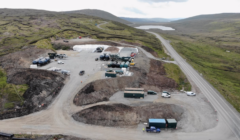Energy / Should energy community benefit payments be increased?
A SCOTLAND-wide energy group has suggested that community benefit payments from onshore wind should increase by nearly 50 per cent.
The Scottish Coalition on Community Energy has also backed the idea of additional payments to bring the total to at least 2.5 per cent of the developer’s revenue from the project.
It comes as the Scottish Government consults on ways to improve how communities receive additional benefits from renewable energy developments.
A report by the energy transition task force presented to councillors in Shetland earlier this month also recommended that the level of community benefit should increase to at least £7,300 per installed megawatt.
‘Community benefits’ are provided by developers to local groups and can include funding, actions such as in-kind works, the direct support of projects, or other site-specific benefits – such as a reduction in energy bills through local electricity discount schemes or building affordable housing.
Locally, this is seen through Shetland Community Benefit Fund (SCBF), which processes £2.2 million a year which comes from the Viking wind farm developer SSE Renewables.
This money is aimed to go towards projects that will benefit the community.
The yearly figure is based off a principle of a payment of £5,000 a year per installed megawatt (MW) capacity. The 103-turbine wind farm has a total capacity of 443 MW.
This voluntary £5,000 per megawatt principle has been recommended by the Scottish Government’s ‘good practice principles’ since 2014. This figure has not increased with inflation.
The Scottish Coalition on Community Energy believes this figure should be increased to £7,300 per megawatt per year – a near 50 per cent rise.
Theoretically under this figure the yearly Viking pay-out would be more than £3.3 million.
With offshore wind farms proposed to the east of the isles, Shetland Islands Council has also previously issued energy development principles.
Become a member of Shetland News
Feedback from the government consultation will be used to update existing guidance on onshore and offshore energy developments, the government said.
Over the past 12 months, more than £30 million has been awarded in community benefits in Scotland, up from £25 million in 2023.
This figure is expected to further increase with investment in clean energy sectors forecast to reach £40 billion over the next decade.
The community energy coalition also suggests that different benchmarks could be set for wind, hydro and solar developments, as well as storage and grid projects.
Acting energy secretary Gillian Martin said: “Scotland is set to become a global renewables powerhouse – generating not only enough green electricity to power all our homes and businesses, but also to export electricity to our neighbours who also need to decarbonise and become more energy secure.
“We believe that communities should be at the heart of this transition, and it is vital that they share in the significant economic and social benefits which will be created as we develop our renewable energy resources.
“This means making sure that energy developments provide community benefit schemes which deliver tangible and long-lasting legacy benefits for local areas – as well as supporting local jobs, supply chain businesses and wider growth.”
Scottish Renewables chief executive Claire Mack said: “Scotland’s renewable energy industry is proud of our positive record to date on community benefits from projects and we want to ensure they continue to deliver for communities. In that effort, however, we must not lose sight of the challenges facing project deployment.
“We look forward to engaging constructively with this consultation to ensure community benefits are sustainable for industry and strategically placed to deliver a long-term, positive impact for local communities.”
Zoë Holliday from the Scottish Community Coalition on Energy added: “We commend the Scottish Government for committing to update the Good Practice Principles for community benefits.
“Since its establishment, the Scottish Community Coalition on Energy has been calling for these to be overhauled to reflect current technologies and context.
“Now is the time to be ambitious and to make improvements to the guidance to ensure a fair deal from the energy transition for communities across Scotland.”
Meanwhile Shetland’s sole Green councillor Alex Armitage said he interprets the words “community benefit” as “community breadcrumbs”.
He said local communities can gain from renewable energy projects in a range of different ways, and in Shetland there are two examples which are at opposite ends of a spectrum.
Armitage said Viking is a “corporate-owned project that extracts the value of Shetland’s natural resources for profit”.
“Apart from the advantage of reducing the carbon-intensity of the electricity grid (and Shetland won’t even be connected until 2026), this projects brings very little benefit to our community,” he added.
“The £2 million annual payment to the Shetland Community Benefit Fund is welcome, but feels like peanuts when set against the £44 million pound funding gap that exists in the Shetland Islands Council budget. Given the fact that the windfarm covers a significant percentage of Shetland’s land area, it’s understandable the folk feel insulted.”
Armitage said at the other end of the spectrum is the much smaller 4.5MW Garth Windfarm in Yell, which is 100 per cent owned by the North Yell Development Council (NYDC), funded by a loan from the ethical bank Triodos.
“The renewable energy produced by Garth is fed into the Shetland grid, earning money for the NYDC, which amounts to approximately £2 million per year – the same as the ‘community benefit’ paid by the entire Viking wind farm.” the Shetland South councillor added.
“The NYDC democratically invests its money into the local community, supporting residents with the cost of living, developing infrastructure and creating more local employment.”
Armitage said it is “jaw-dropping” that Garth and Viking deliver a similar financial uplift to their communities, given their difference in size.
He added that the large-scale development of alternative energy to replace fossil fuels is “vital”, saying climate related floods, famines and forest fires seen around the globe are “just the beginning of a worsening pattern of climate breakdown”.
Armitage also said the Scottish Government consultation on community benefits is “so vitally important because we have the opportunity to make the case as strongly as possible as to how renewable energy should be developed – and for whose benefit”.
He acknowledged that the renewable energy landscape is “complex and multifaceted, and intersects with other industries, primarily fishing, which is vital for the future of our economy”.
“For Shetland, the advent of renewable energy is the single most important issue of our generation,” Armitage continued.
“A passive approach, where we sit back and let development happen to us, decrying the lack of powers that we have to change things, will get us nowhere. We must be bold, ambitious and active in our approach.”
The Green elected member also said he was heartened to see the endorsement by the SIC of the energy transition taskforce report earlier this month, which he said came about after a group of “rebel councillors” rejected a draft energy strategy drafted by officials earlier this year.
“In rejecting the strategy, councillors were clear that we needed to be far more ambitious and focused on getting a fair share for Shetland from the energy transition,” he added.
“What happens now is up to all of us. Our future prosperity is at stake. We need effective leadership from our politicians but we also need our whole community on board. Energy corporations, who do not have Shetland’s future best interests at heart, favour a weak, divided community. To realise a fair share for Shetland, our community must be strategic, strong and united.”
Become a member of Shetland News
Shetland News is asking its many readers to consider paying for membership to get additional features and services: -
- Remove non-local ads;
- Bookmark posts to read later;
- Exclusive curated weekly newsletter;
- Hide membership messages;
- Comments open for discussion.
If you appreciate what we do and feel strongly about impartial local journalism, then please become a member of Shetland News by either making a single payment, or setting up a monthly, quarterly or yearly subscription.

















































































